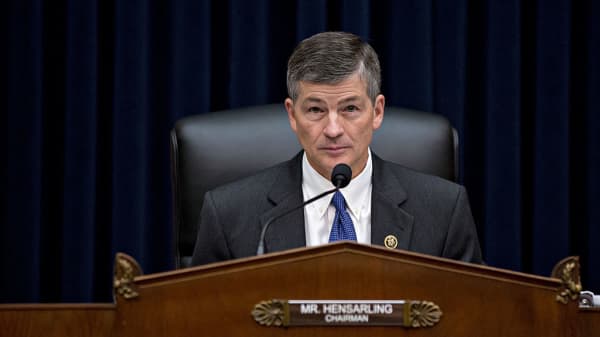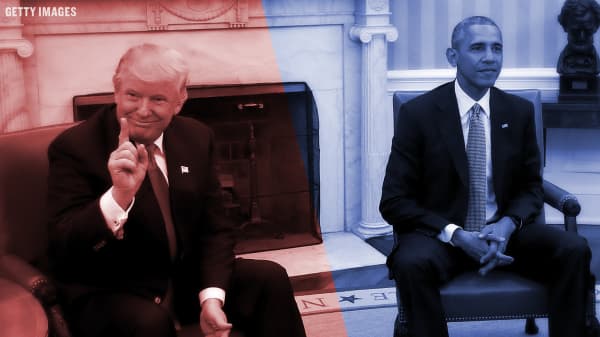This article is part of a series on the "Future of Politics" that explores the effects of the 2016 election on the future of policy, parties, candidates, campaign style and the overall political environment going forward.
The Trump administration's approach to the two most important legislative accomplishments of the Democrats in 2009-2010 follow the pattern set by Congressional Republicans when they took control: Targeting the Affordable Care Act for repeal and being much more tentative about plans for the Dodd-Frank Wall Street Reform and Consumer Protection Act.
Republicans made full, repeated use of their legislative authority to push for repeal of the Affordable Care Act in the House, and then, when they were in charge, in the Senate as well, finally sending a bill to Obama for an unsurprising veto. And, when Trump took office, this became one of his first priorities.
In sharp contrast, Congress never set any serious legislative action for complete repeal or even substantial weakening of the Wall Street Reform and Consumer Protection Act, even in the conservative-dominated House, with its tough rules giving the majority complete freedom of action. And when they finally got majorities in both houses, no major assault to the bill came close to the president's desk.
Following this pattern, Trump, his designated appointees, and the congressional Republican leadership have all made clear that a complete abolition of the ACA is not only on their agenda, but heads it. And in contrast to this certainty of both goal and timing, they have set forth no plan of action for doing away with or even substantially diminishing financial reform.
"One thing has obviously changed. To use the common legislative metaphor, as with health care, the fight over this [financial-reform] law in the next few years will be using real bullets—i.e., with Trump as president, Congressional Republicans will no longer either face the frustration or enjoy the comfort of knowing that their efforts are simply expressions of their ideology, but know that they will have real consequences."
It is true that Trump's administration and congressional Republicans have expressed opposition in principle to the financial reform law which they characterize as excessive regulatory interference with the financial system, with occasional claims—with no supporting evidence or even, logical argument—that it has slowed economic growth.
And while I have not seen him quoted specifically on the subject, I have first-hand knowledge of the depth of the aversion to the law felt by Carl Icahn, Trump's designated chief advisor on financial regulation. In my last re-election, in 2010, Icahn gave the maximum donation to the unsuccessful effort to defeat me. Given the lack of any previous evidence of his interest in the communities I represented nor any interaction between us, I do not think it is self-centered for me to conclude that his donation was likely motivated by his anger at me for my co-sponsorship of the financial-reform bill.
So, there are two questions to be answered in trying to predict what will happen to the Wall Street Reform act in the Trump years. First, why was there so little serious Republican effort to undo it from 2011 until now? Second, is there any reason to think the factors that led to this relative passivity are no longer operative?
One thing has obviously changed. To use the common legislative metaphor, as with health care, the fight over this law in the next few years will be using real bullets—i.e., with Trump as president, Congressional Republicans will no longer either face the frustration or enjoy the comfort of knowing that their efforts are simply expressions of their ideology, but know that they will have real consequences. To a great degree, this pushes them to act—to follow through on promises made because there will be no Democrats to blame for failure to do so.
But it also complicates the political benefit-cost equation, especially for financial reform. The single biggest deterrent to Republican congressional action to do away with the changes made by the Wall Street reform bill for the past four years is its popularity with the public. And unlike health care, support for that law cuts across party lines. Cutting back the power of the Consumer Financial Protection Bureau, re-deregulating derivatives, restoring the full power of lenders to make imprudent mortgage loans while retaining no responsibility for them do not poll well.
And Republicans facing election contests in 2018 in all but the safest districts fully understand the ads that can be built around these themes. Having voted for the successful bill to leave the Consumer bureau less able to deal with the next Wells-Fargo like scam, or freeing up AIG to repeat the behavior that left them needing $170 billion from the Federal Reserve to avert a global disaster, and resorting to the Fed the legal ability to provide, are not winning issues—no matter how much Carl Icahn contributes to your campaign on their behalf.
While Trump's presidency means that these changes could become law, the nature of his campaign makes them even more politically dangerous. Of all the contradictions that exist between Trump's populist rhetoric and his pro-establishment agenda, this is the greatest. Elizabeth Warren's ability to annoy him will be greatly magnified if she can quote Trump's campaign rhetoric—e.g. his Goldman Sachs ad—in opposition top Republican efforts to restore to Goldman the right to pursue the business practices he railed against. (In fairness to Goldman, a phrase I acknowledge you don't often read, they have not been pushing hard for the right to do so.)
There is a basis for a bipartisan consensus to make some accommodation in the law for small- and mid-sized banks in ways that do not diminish whether its power to protect consumers or its ability to curtail irresponsibly. But this leads me to a discussion of one other factor which contributed to the Republicans failure to act in this area before Trump, and which will continue to plague them in the future: There is a serious difference of opinion among Republicans when it comes to financial reform.
The split between former Speaker John Boehner and House Financial Services Committee Chair Jeb Hensarling was so deep as to have left the committee in the past with no ability to move its agenda. While things are much less strained under Paul Ryan, Hensarling's deep-rooted commitment to a pure laissez-faire approach goes beyond what many of his co-partisans support.
For example, Hensarling has expressed opposition to increasing the current $50 billion figure at which a bank falls under supervision by the Financial Services Oversight Council, insisting instead on much more radical change. (Author's note: I expressed my personal support for this change in 2013 when it was proposed by Fed Governor Daniel Tarullo. This has allowed me to continue to support the move with a clear conscious after joining the board of Signature Bank two years later. At the time I agreed with Tarullo, I had not heard of Signature Bank and obviously, therefore, had never considered joining its board.)
One last point is relevant to speculating what the Trump years will bring to financial reform. Given the power of the president to appoint all of those responsible for exercising the power of the law, they can substantially weaken it without legislating—a fact which I cite unhappily. This may end up being a way out of some Republican political dilemma.
Commentary by Barney Frank, chair of the House Financial-Services Committee from 2007 to 2011, during which time Congress enacted the TARP program and the financial-reform bill known as Dodd-Frank. Follow him on Twitter@BarneyFrank.
For more insight from CNBC contributors, follow @CNBCopinion on Twitter.






